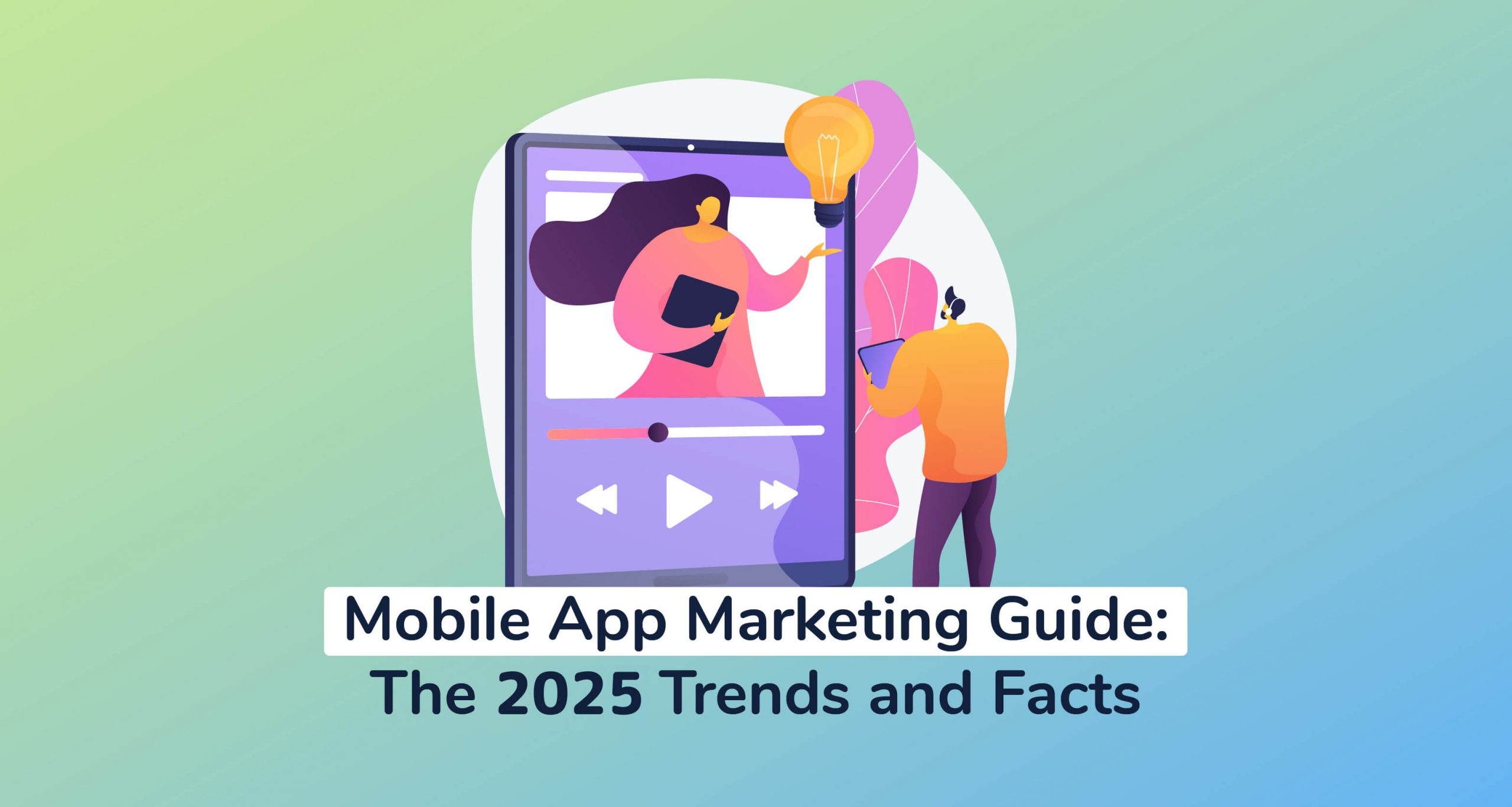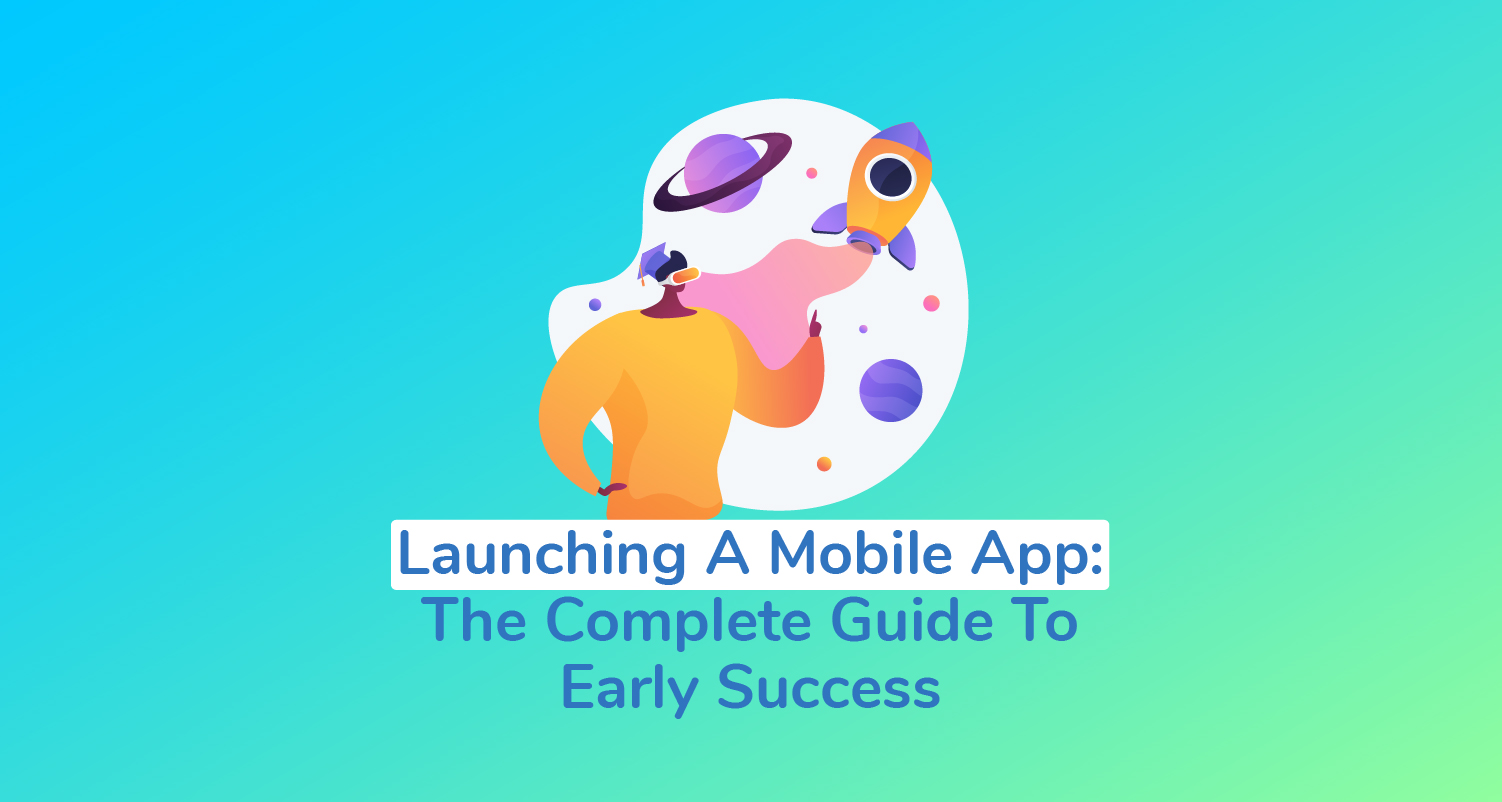
The Minimum Standards For Evaluating App Marketing Services Agencies
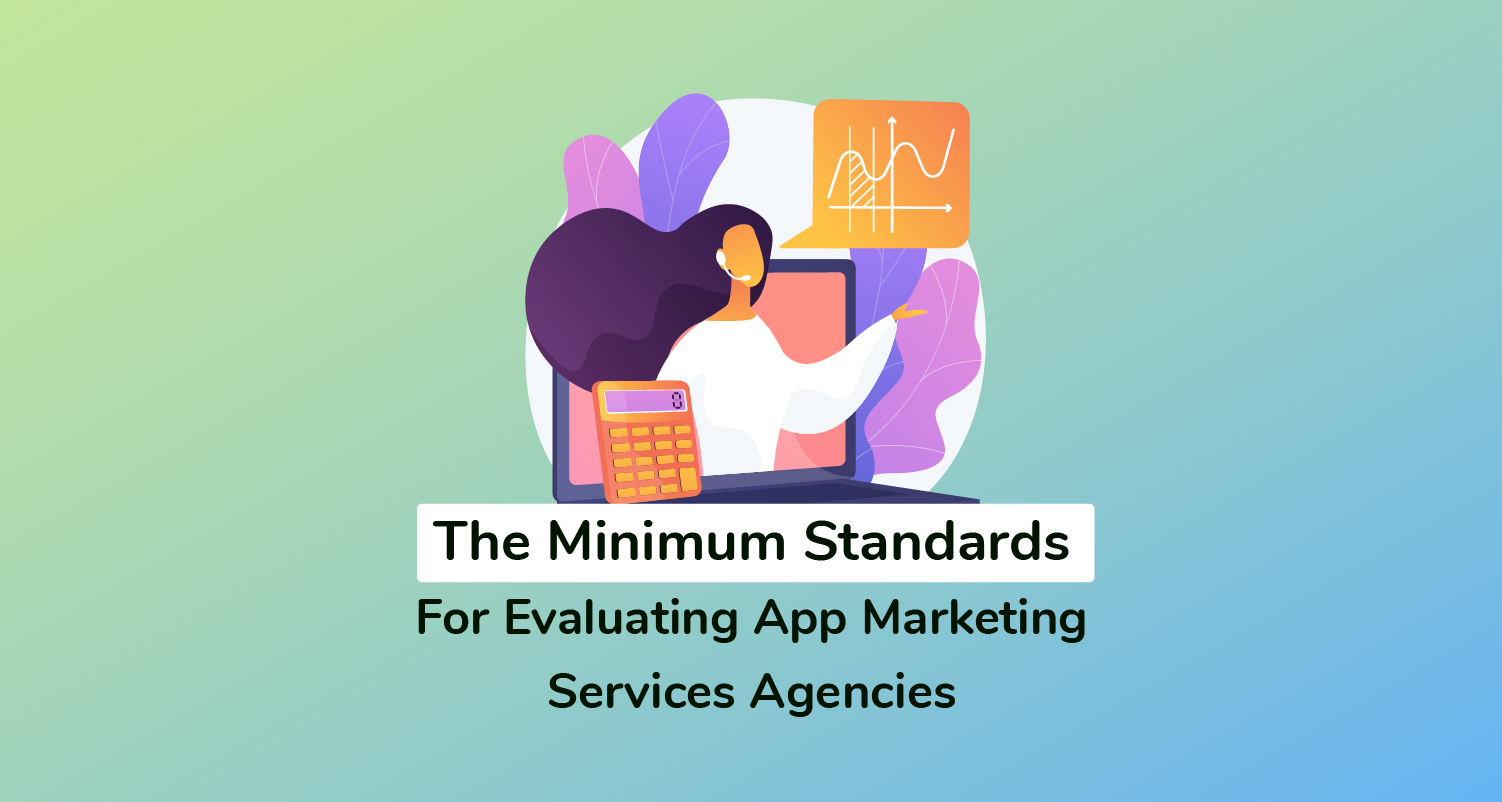
Ok, I’ll be blunt about mobile app marketing services, and admit that what they say about the accompanying costs is partly true. That full-service mobile marketing companies ordinarily charge their clients tens of thousands of dollars for the app marketing solutions.
Table of Contents
- Hiring A Mobile App Marketing Agency Vs. Doing It Yourself
- #1. The Complex Process of Mobile App Development And Maintenance
- #2. The Benefit Of Hiring A Mobile App Marketing Agency
- When Should You Engage A Mobile App Marketing Agency?
- #1. Pre-Launch App Marketing
- #2. App User Acquisition Campaigns
- #3. App User Retention Campaigns
- The 5 Bare Minimum Mobile App Marketing Services That You Should Get From Your Marketing Agency
- #1. Creation And Distribution Of App Press Releases
- #2. App Review Submission
- #3. App Demo Video Production
- #4. App Store Optimization
- #5. Viral App Marketing
- Key Takeaways
Understandably, this fact alone continues to trigger a lot of controversy and debate, typically pitting mobile marketing companies against app owners and app publishers.
While the former blame it all on the technicalities that accompany app advertising, the latter group overwhelmingly insists that app user acquisition campaigns shouldn’t cost almost as much as mobile app development.
You see, according to recent industry reports, it turns out that while developing an advanced mobile app might cost you as much as $211,000, a simple app with basic user features requires as little as $24,830 – which is more or less within the fee range for premium mobile app marketing services.
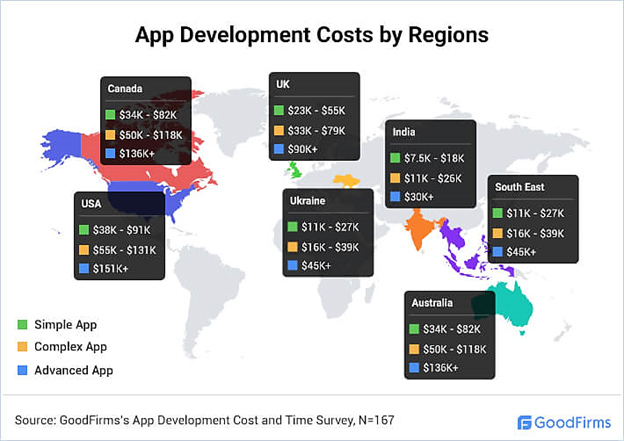
Now, if you compare these figures, you might probably feel justified to ignore high-level mobile marketing companies – and, instead, choose to handle your app marketing campaigns in-house.
Besides, what’s so difficult about the app user acquisition campaigns? Why spend thousands of dollars on a premium mobile app marketing agency, yet there are many alternative options at a fraction of the cost?
Ok, fair enough. But then again…
Wouldn’t it be unwise to make such a high-stakes decision based on assumptions? I mean, instead of obsessing about the costs of the mobile app marketing services, shouldn’t you compare the campaign options based on their respective overall value and ROI?
Put simply, this is where you ought to ask yourself what you really stand to gain from the mobile app marketing agencies.
What types of mobile app marketing services should you expect to get, at the very least, from a full-service mobile marketing company? How will they impact the success and performance of your mobile app?
Well, it’s because of these concerns that I’ve decided to compile a guide that reveals the truth, and nothing but the truth, about what you truly stand to gain from your mobile app marketing agency. And while you follow along, please keep in mind that the mentioned mobile app marketing services happen to be the bare minimum that you should evaluate agencies on.
First things first, though. How does a mobile app marketing agency fit into the whole app development cycle? Why would you even consider hiring a marketing company, instead of handling everything in-house?
Hiring A Mobile App Marketing Agency Vs. Doing It Yourself\

To understand the role of a mobile app marketing agency, allow me to take you back to where the journey actually begins.
You see, for most app owners who are just starting out, mobile app marketing is probably not even their biggest concern. They tend to be more focused on mobile app development – a trend that is completely understandable.
Don’t get me wrong, though. I’m not saying that they disregard mobile app marketing.
On the contrary, app owners overwhelmingly appreciate the role of mobile app marketing. By the time they embark on their mobile app projects, they’re usually aware that even the best-developed mobile apps ultimately need effective marketing campaigns to overcome the increasingly stiff market competition.
However, one of the most popular beliefs at this point is that it’s possible to juggle between mobile app development and app advertising.
Some app owners imagine that app development is just a static one-time process that they can somehow get done and then embark on app install campaigns by the time the app is launched on the App Store or Google Play Store.
Well, that might sound like a sensible plan for some time – until it eventually becomes apparent that neither app development nor app marketing is as simple as it seems.
The Complex Process of Mobile App Development And Maintenance
The whole process of building a mobile app, for instance, requires more time and dedication than, say, making a car.
Yes, that’s right. Believe it or not – by the time your team manages to develop and publish a standard mobile app, a basic vehicle manufacturer would have produced about 168 units.
You see, on average, it takes about 10 weeks to build the back-end, while the corresponding front-end requires about 8 weeks of development. In the end, therefore, your mobile app development team would need a total of four and a half months.
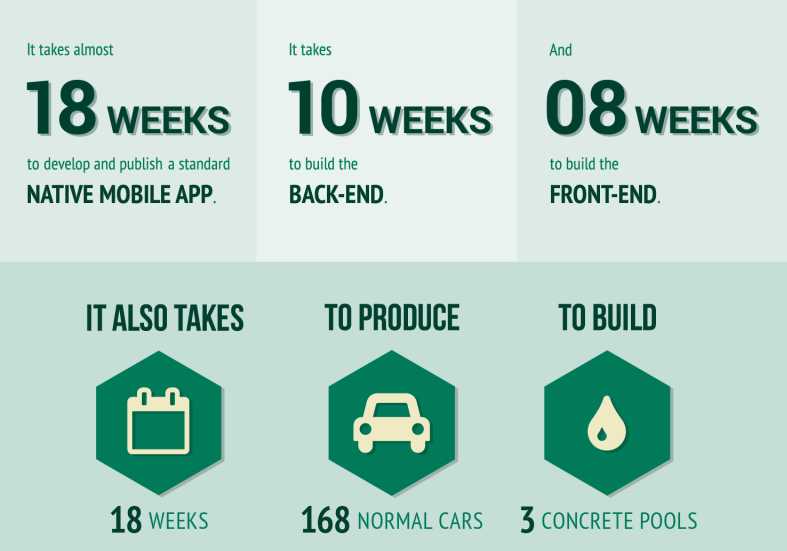
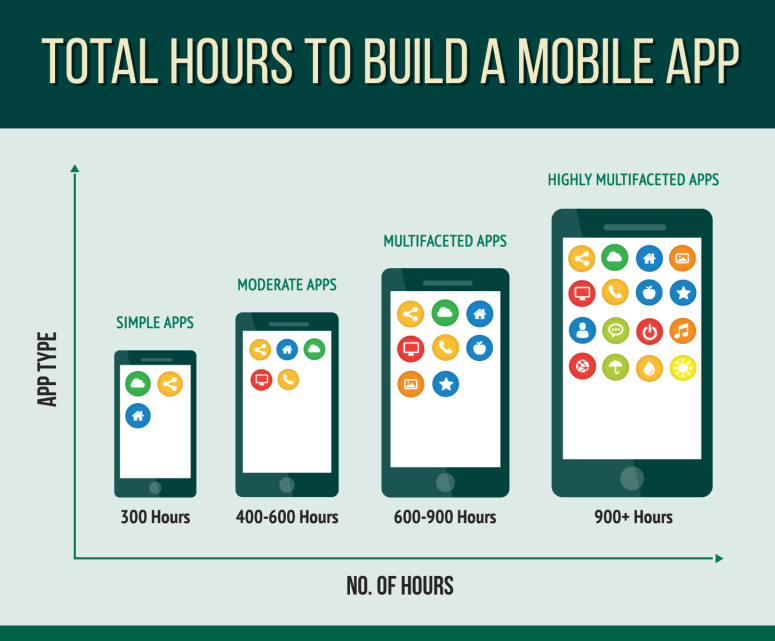
Part of the reason why it takes so long is, mobile app development is an extensively dynamic multi-stage process. In addition to designing and building the back-end and front-end interfaces, you still have to come up with prototypes, distribute them to beta testers, and then review the subsequent user feedback.
Another important point to note here is that the mobile app development process doesn’t really end with an app launch. Rather, once you get published on the App Store or Google Play Store, app development immediately shifts to technical app support and maintenance.
Well, of course, you could choose to wear multiple hats by juggling between all that and managing your mobile app marketing strategy. But then again, let’s be honest about it – chances are, your entire schedule will be so stretched out thin that neither app maintenance nor app marketing will get the attention it deserves.
Now, that’s precisely where mobile app marketing agencies come in.
The Benefit Of Hiring A Mobile App Marketing Agency
While you worry about reviewing all the possible app bugs and maybe aligning the features with each platform update, you need someone else to take charge of marketing
Well, that’s the basic principle behind hiring mobile app marketing companies. You essentially bring in the big guns to drive your app downloads with their specialized app marketing solutions and expertise – while you, on the other hand, get busy with business management, mobile app development, and technical maintenance.
But then again, make no mistake about the whole approach. Successful apps don’t really wait until app launch to engage a mobile app marketing agency.
When Should You Engage A Mobile App Marketing Agency?
As it turns out, the close relationship between mobile app marketing and mobile app development processes doesn’t begin after launching the app. Rather, they ought to run parallel to each other from the moment your app prototypes start taking shape.
In other words, I’m advising you to seriously consider engaging your mobile marketing agency early during the app development process. At least then you’ll be able to capitalize on the full-stack of mobile app marketing solutions, which comprises the following subsets of strategies:
- Pre-Launch App Marketing
- App User Acquisition Campaigns
- App User Retention Campaigns
#1. Pre-Launch App Marketing
Just as the prefix suggests, pre-launch app marketing comes into play way before the app is even published on the App Store. This campaign fundamentally seeks to not only prepare the app for the market but also get the market warmed up for the app ahead of its launch.
Your marketing company will, for instance, start by conducting extensive market research to identify potential opportunities that the app could capitalize on for success. They’ll even leverage various App Store Optimization tools to generate intel that you could eventually use to outrank your competitors.
Another important step in pre-launch app marketing is beta testing. This is where an early version of your mobile app is distributed across prospective users – who then proceed to test it out, before eventually providing valuable feedback on possible bugs, app performance levels, etc.
When the app launch date finally approaches, your app marketing agency will further try generating buzz through popular media publications, app review platforms, and social media influencers.
#2. App User Acquisition Campaigns
While pre-launch app marketing is all about perfecting the product and generating early buzz, app user acquisition focuses on driving app downloads and installs. You can think of it as a post-launch campaign that gets your app discovered and downloaded by its target users.
Now, to achieve that, your mobile app marketing service should try to boost visibility across all the relevant app discovery channels. This is where App Store Optimization really comes in handy, as it significantly influences both organic and paid App Store search ranking.
Other than that, the marketing company might use SEO, web landing pages, social media app advertising, etc.
As for the subsequent user acquisition costs, these strategies have, so far, attained a global CPI (Cost Per Install) average of $1.75. Google Play Store apps are particularly lucky, as they average at about $1.22 per app install – while iOS apps, on the other hand, cost their marketers $3.6 per app install.
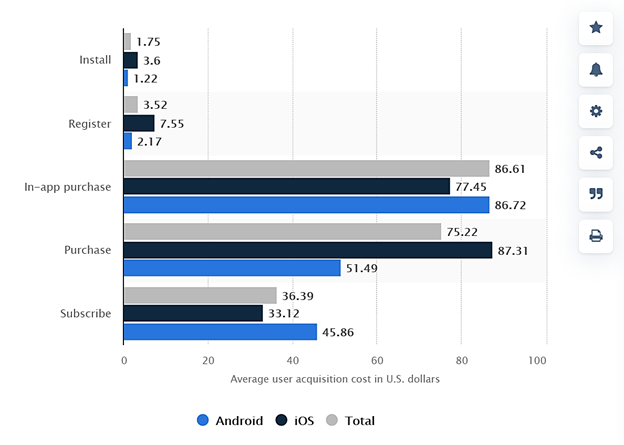
#3. App User Retention Campaigns
Convincing prospects to download and install your app is only the first step in a typical mobile app life cycle. As such, you cannot really base the success of your mobile app based on just its download numbers. You should, instead, pay more attention to the actions that users take after app installation – such as registration, in-app purchase, service subscription, etc.
Now, to drive these actions, your mobile app marketing agency ought to engage what we call app user retention campaigns. While user acquisition strategies continue to bring in fresh installers, user retention campaigns establish connections with the app users and then get them to commit for the long haul.
PreApps, for example, has been taking advantage of push notifications to communicate with existing app users, in a bid to tactfully convince them to take action. Google UAC has also proven to be quite effective in retargeting app users with personalized campaign messages, which are usually spread out across Google’s digital ad channels.
Without such engagement strategies, you risk losing the bulk of your users just weeks after they’ve installed the app.
By day 30, for example, it turns out that mobile apps manage to retain only 2.3% to 13.4% of their initially acquired users. Each industry category has its unique average figure – with comics, shopping, news, and gaming apps emerging as the best performers, while apps for productivity plus food and drinks tend to lose the largest volume of app users.
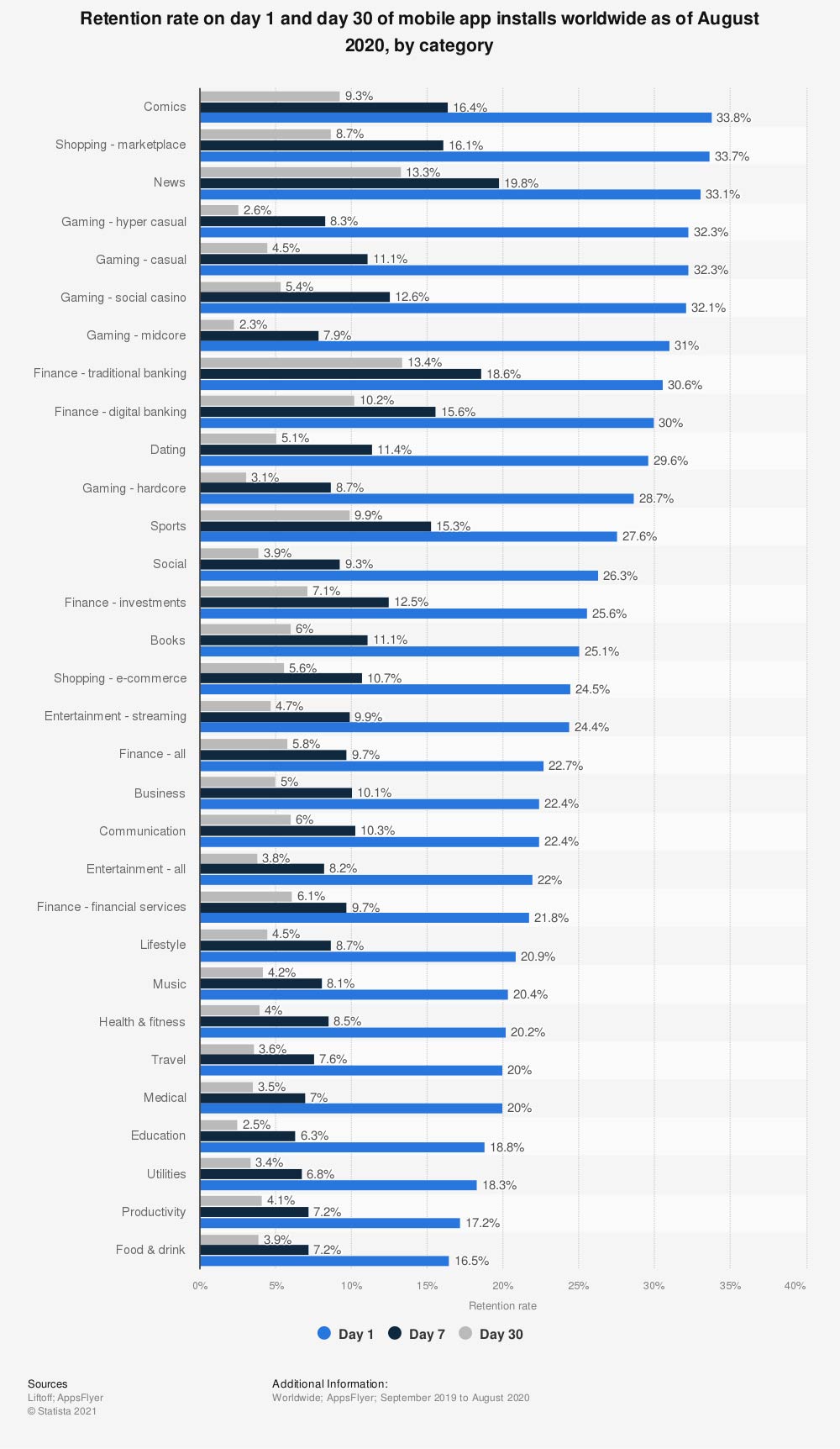
The 5 Bare Minimum Mobile App Marketing Services That You Should Get From Your Marketing Agency
Now that we’ve established why and when you should hire a mobile app marketing agency, here’s a breakdown of the types of marketing solutions that you ought to receive in return.
You can go ahead and refer to this list whenever you’re evaluating the standard of services across different marketing companies. It sums up the five app marketing solutions that you should prioritize if you intend to get real value for your money.
#1. Creation And Distribution Of App Press Releases
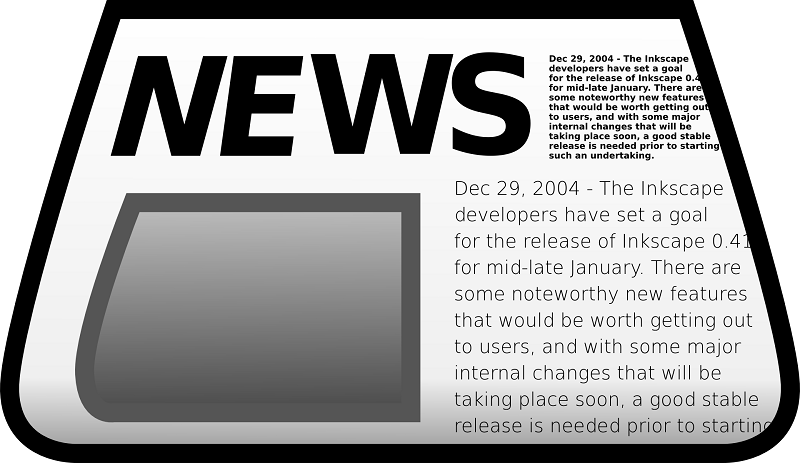
Whichever category or industry you fit into, the outcome of your mobile app marketing campaigns substantially depends on your organic audience reach before and after launching the app.
While the App Store itself boasts over half a billion visitors every week, you can’t really count on it for your pre-launch app marketing.
And even if you published the app, your App Store Optimization tweaks wouldn’t quite help you out right away. You’d have to gradually build a rapport for months before working your way to challenging over 2.2 million other apps that preceded yours.
Social media and content marketing aren’t easy hacks either. They both require a lot of time and dedication to build a solid organic following.
In the meantime, however, one particularly clever alternative that your mobile app marketing agency ought to consider is capitalizing on already popular platforms.
Well, media publications are gold mines when it comes to that. And an app press release is the best way to start reaching out to their extensive readership bases.
The problem is, however, it would take ages to get noticed by a renowned editor or journalist in your space. Considering that over 15% of journalists receive 250 to 499 emails per day, it’s quite possible that you’re not the only applicant.
You can bet that there are hundreds of other determined business owners trying to reach out to the same target editors and media publications. If that’s the case, can you think of any specific reason that would convince the publications to pay special attention to an unknown mobile app?
Well, luckily for you, that shouldn’t be a problem if you choose to work with a well-established mobile app marketing agency. Chances are, they’ll have already built a strong network of connections with leading media platforms.
That alone makes it possible for even a little-known app to get featured on popular publications.
You might, in particular, want to maximize these press releases during prelaunch app marketing – as a means of establishing a solid reputation for your upcoming app. Then as a post-launch strategy, you’ll still be able to notify people about new developments like updates and app versions.
#2. App Review Submission

As we’ve established, a well-composed app press release is capable of driving quite a lot of attention towards your application.
And that’s not all – the resultant fame might additionally get you a decent volume of app downloads during app launch.
But then get this – while hitting the ground running with many app downloads can be pretty exhilarating, your mobile marketing company ought to advise you that the app installs don’t really translate to success.
You see, on average, mobile apps tend to lose more than 80% of their initial users after installation. This occurs progressively over a number of days, although the bulk of the losses come within the first three days.
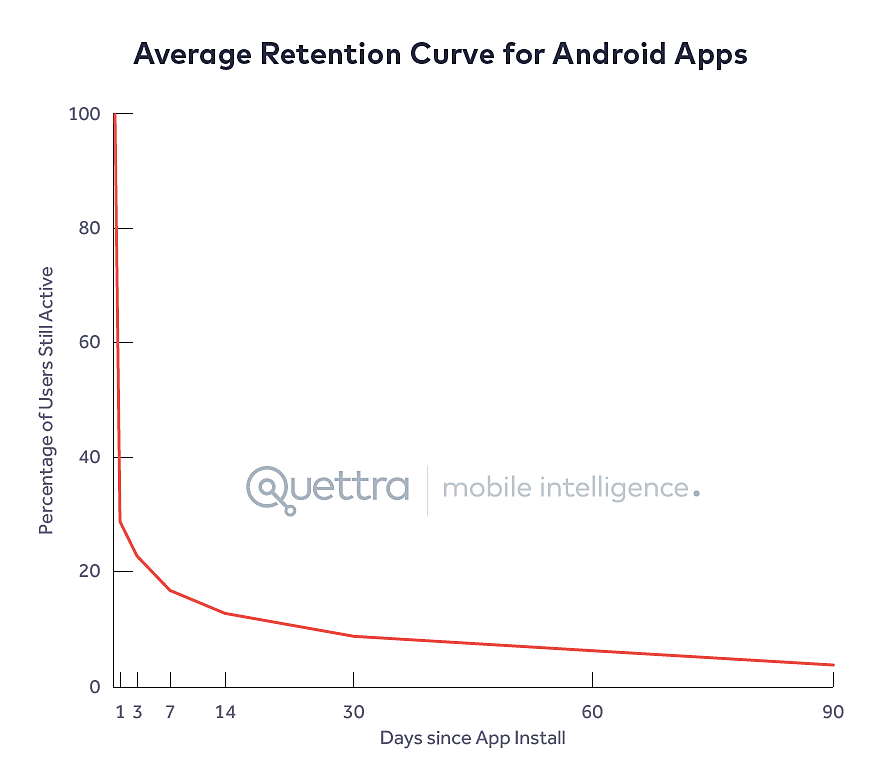
And why is that?
Well, the thing is, mobile app users tend to drop out because of two primary reasons – technical bugs, and poor user experience.
Admittedly, both might seem like issues that you can personally flag up during the app testing stage. A good mobile app marketing agency, however, will advise you not to rely entirely on your personal opinion.
Regardless of how good or obsessive you are as a mobile developer, it’s impossible to fully diagnose your app from just your point of view. I mean, there’s a reason why doctors don’t treat themselves in the first place.
Having your family and friends test out the mobile app is totally acceptable. But, keep in mind that they may not have the capacity to fully review it, or represent the opinions of the larger market.
As such, you ought to use your mobile app marketing company to reach out to as many prospects as possible. All it takes is for the marketing agency to identify the appropriate mobile app review platforms from its wide app distribution network, and then submit the app for user testing and reviews.
It doesn’t stop there, though. A good marketing agency can even get your app reviewed by celebrities, thanks to its strategic industry relationships and market positioning. Then to top it off, popular app review platforms will highlight your app’s best features in their review publications.
So, in the end, you can count on the mobile app reviews to generate not just valuable user feedback, but also market buzz. Just enough to attract the right attention ahead of the app launch.
#3. App Demo Video Production
If an image is worth a thousand words, imagine how effective a video would be in convincing your prospects to just get on with the app.
It’s no secret that our preferences on content have been gradually changing. Previously, text alone seemed good enough. Then as data speeds and gadget hardware improved, people began shifting to images and videos.
Ultimately, even Google and Apple took the cue and then introduced app demo videos on their platforms, as a way to give users a realistic feel of the mobile apps from the App Store pages.
This move alone has proved to be quite the turning point for published mobile apps. So impactful have the videos been, in fact, that they’ve even surpassed the accompanying text descriptions.
Yes, that’s right – app descriptions are no longer an important part of the App Store user experience.
While users now spend an average of just 7 seconds on the App Store pages, at least 70% of them scroll straight down to the screenshots, 13% skip through the screenshots, and only 3% are patient and curious enough to actually enlarge the images. App demo videos, on the other hand, attract about 1% of the visitors.
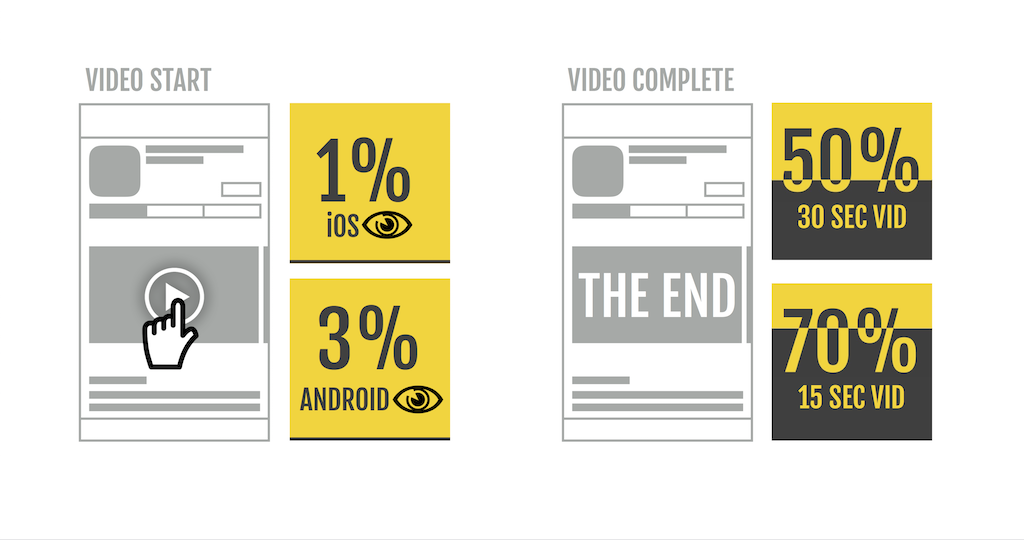
Ok, I know that 1% might not seem like much, but try to imagine the sheer number of visitors that a well-ranking app receives in a day. You’d obviously need a bunch of next-level strategies to engage and convert all those prospects in just a few seconds they spend on the page.
Now, that’s where the mobile app demo videos come in. As it turns out, it’s far easier to engage and convince a prospect through a video than text or screenshots. That’s why your best shot at conversion is actually the 1% views that go-to mobile app videos.
Here’s the caveat, though. These conversions are only possible with an exemplary app demo video. So, you might want to work with a mobile marketing agency that knows just how to maintain a perfect balance between information and engagement.
Sounds simple for an app demo video, but quite the challenge when it comes to shooting one without breaching Apple’s strict guidelines – such as the 30 seconds limit on the video running time
Thankfully, this is where the finesse of mobile app marketing experts comes in handy. The mobile app marketing services they provide are meant to create an exemplary video that targets just the right audience with proven selling points.
Additionally, they should be willing to distribute your videos to third-party platforms as a means of expanding your audience reach.
#4. App Store Optimization
According to research conducted by Tune, App Store search is the single most popular method of discovering mobile apps. 47% of iPhone users in the U.S. claim to have discovered their newly installed apps after searching on the App Store.
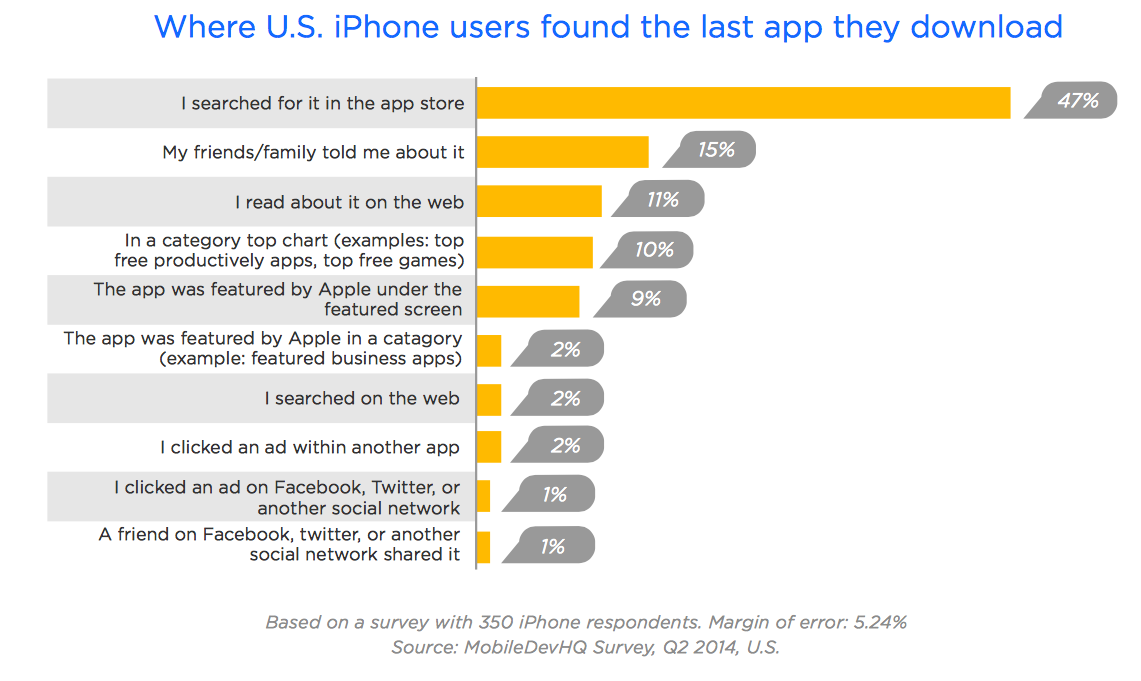
That alone qualifies App Store Optimization as the mother of all app marketing strategies.
But, don’t get me wrong. I’m not saying that you won’t need other mobile app marketing strategies. While an omnichannel app marketing campaign is the way to go, an app that has prioritized ASO over everything else has much greater chances of success than one that, say, chooses to rely on just social media marketing.
That said, App Store Optimization is all about aligning your app page elements with the App Store search algorithm, in a bid to improve your app’s ranking within the search results. So if done well by your mobile app marketing agency, you could outperform even well-established competitor apps.
On the flip side, however, it goes without saying that although App Store Optimization is pretty effective, it can also be quite complicated. You’ll notice, for instance, that both the iOS App Store and Google Play Store require you to tweak not only your keywords, but also the app screenshots, app title, and app demo videos.
Well, of course, you could use our free PreApps App Report tool to track, audit, and improve your App Store Optimization parameters. But, even then, you’ll still need to work closely with ASO experts.
At least they’ll have the right amount of finesse and experience to act on the analytics accordingly.
#5. Viral App Marketing

Previously, the concept of “overnight success” was only used as a figurative idiom. Then came social media, and everything changed.
We’ve all seen individuals and products blowing up and making huge fortunes in a relatively short period of time – all thanks to the popularity that comes with going viral.
Viral mobile app marketing follows pretty much the same concept. This is where you hire a marketing company that knows just how to control digital trends using social media engineering. If done strategically, you could see the popularity of your app spreading like a wild bush fire.
That’s how Tinder, in fact, managed to rise to the top of the dating app scene in just a short period of time. It launched into a market that already had many dating platforms but then proceeded to grow from a $47 million per year company to one that now rakes in over 1.4 billion annually. All this mobile app growth was realized in just 5 years.
Now that sums up the best part about viral app marketing. The hardest task, however, is figuring out how to do it, and subsequently, finding just the right amount of traction to maintain accelerated growth over the long haul.
Paid inorganic marketing may give you some exposure all right, but it’s ineffective when it comes to the context of viral marketing.
You need a mobile app marketing company that will spark organic conversations around app-related topics, and then proceed to build on the subsequent engagement for increased app success.
Key Takeaways
To sum it all up, here are the most notable points we’ve covered:
- While developing an advanced mobile app might cost you as much as $211,000, a simple app with basic user features requires as little as $24,830 – which is more or less within the fee range for premium mobile app marketing services.
- One of the most popular beliefs among app owners is that it’s possible to juggle between mobile app development and app advertising.
- By the time your team manages to develop and publish a standard mobile app, a basic vehicle manufacturer would have produced about 168 units.
- On average, it takes about 10 weeks to build the back-end, while the corresponding front-end requires about 8 weeks of development.
- The mobile app development process doesn’t really end with an app launch. Rather, once you get published on the App Store or Google Play Store, app development immediately shifts to technical app support and maintenance.
- Your Mobile app marketing company is meant to drive your app downloads with its specialized app marketing solutions and expertise – while you, on the other hand, get busy with business management, mobile app development, and technical maintenance.
- The close relationship between mobile app marketing and mobile app development processes doesn’t begin after launching the app. Rather, they ought to run parallel to each other from the moment your app prototypes start taking shape.
- The full-stack of mobile app marketing solutions comprises the following subsets of strategies: Pre-Launch App Marketing; App User Acquisition Campaigns; and App User Retention Campaigns.
- Prelaunch app marketing fundamentally seeks to not only prepare the app for the market but also get the market warmed up for the app ahead of its launch.
- While pre-launch app marketing is all about perfecting the product and generating early buzz, app user acquisition focuses on driving app downloads and installs.
- The average user acquisition costs across the globe – in terms of CPI – are $1.75. Google Play Store apps average at about $1.22 per app install – while iOS apps, on the other hand, cost their marketers $3.6 per app install.
- You cannot really base the success of your mobile app based on just its download numbers. You should, instead, pay more attention to the actions that users take after app installation.
- While user acquisition strategies continue to bring in fresh installers, user retention campaigns establish connections with the app users and then get them to commit for the long haul.
- By day 30, it turns out that mobile apps manage to retain only 2.3% to 13.4% of their initially acquired users.
- The App Store itself boasts over half a billion visitors every week.
- It would take ages to get noticed by a renowned editor or journalist in your space, as over 15% of journalists receive 250 to 499 emails per day.
- You might want to maximize app press releases during prelaunch app marketing – as a means of establishing a solid reputation for your upcoming app. Then as a post-launch strategy, you’ll be able to notify people about new developments like updates and app versions.
- On average, mobile apps tend to lose more than 80% of their initial users after installation. This occurs progressively over a number of days, although the bulk of the losses come within the first three days.
- Regardless of how good or obsessive you are like a mobile developer, it’s impossible to fully diagnose your app from just your point of view.
- A good marketing agency can even get your app reviewed by celebrities, thanks to its strategic industry relationships and market positioning.
- While users now spend an average of just 7 seconds on the App Store pages, at least 70% of them scroll straight down to the screenshots, 13% skip through the screenshots, and only 3% are patient and curious enough to actually enlarge the images.
- App demo videos attract about 1% of the visitors.
- It’s far easier to engage and convince a prospect through a video than text or screenshots. That’s why your best shot at conversion is actually the 1% views that go-to mobile app videos.
- App Store search is the single most popular method of discovering mobile apps. 47% of iPhone users in the U.S. claim to have discovered their newly installed apps after searching on the App Store.
- Viral app marketing entails hiring a marketing company that knows just how to control digital trends using social media engineering
Over To You
Overall, these minimum standards prove that mobile app marketing goes much deeper than just running paid ads on social media, or maybe pasting keywords to your App Store page.
As such, it’s understandable why strategic Android and iOS apps are increasingly turning to specialized mobile app marketing companies. This move alone saves them a lot of trial and error, as all the dynamic omnichannel campaigns are left to the real experts.
PreApps itself has been in the business for over a decade now, within which our well-tailored app marketing campaigns have amassed over half a billion mobile app downloads. And while at it, we’ve, of course, used every opportunity to confirm the efficacy of various strategies against the ever-changing market dynamics.
So, you can rest assured that your mobile app marketing plan will be developed and rolled out with precision. More than 3,300 mobile applications have, in fact, been where you are today – before, ultimately, our agency expertise managed to convert every single one of them into a success story.
We can do the same for you. Just let us know you are precise, and our extensively experienced mobile app marketing team will proceed to make you the next success story.
Newsletter
Don’t miss a thing! Sign up to receive daily news
Subscribe Newsletter




